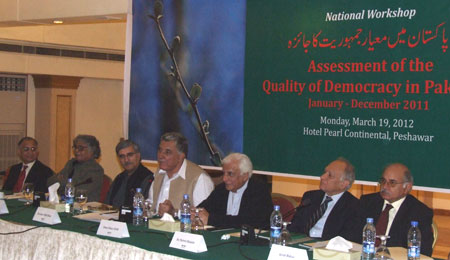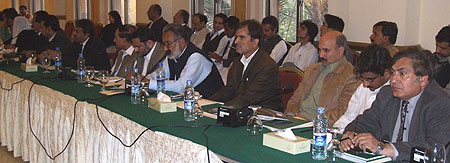|
|
| |
| EVENTS |
|
|
> National Workshop on Assessment of the Quality of Democracy in Pakistan
|
|
|
| |
PILDAT organised a National Workshop over Assessment of the Quality of Democracy in Pakistan on March 19, 2012 in Peshawar where members of the Democracy Assessment Group shared with the representatives of a cross section of society and media their analysis based on the report Assessment of the Quality of Democracy in Pakistan: 2011. |
|
| |
Mr. Karamat Ullah Khan, Speaker, Provincial Assembly of Khyber Pakhtunkhwa, who chaired the session, said that the process of democracy has been ongoing for the past four years, despite being uprooted and trampled upon many times. The devolution process has increased workload of the Provincial Assemblies; however there is a need to develop their capacity to deliver services more effectively. The provinces have received their rights with the passage of the 18th Amendment, but they lack administrative capacity to effectively use these resources. The environment of war on terror makes the process of democracy more challenging. According to the Speaker, rule of law can be demonstrated with the Prime Minister�s appearance to Supreme Court. The devolution of NFC is another positive milestone for the coalition government. The closure of Shamsi Airbase and blockage of NATO ground supplies demonstrates the growing strength of political process within Parliament.
|
|
| |
He said that while the media has played an important role in supporting democracy, Pakistan�s talk-show culture is criticized in the South Asian region for political point scoring. When Pakistan and India countries came into existence, there was a convergence in the process of democracy. The Indians do not believe in shortcuts, said the Speaker. Even if democracy is problematic, it is better than a military regime since it is representative of the people�s desire. Militancy has led to much bloodshed. In this context, public participation becomes only more important. The question of accountability remains critical, and this Assembly is attempting to establish oversight on public accounts. The Speaker added that six reports have been published on public accounts by the Provincial Assembly of Khyber Pakhtunkhwa. |
|
| |
Shazia Tehmas Khan, Member of the Provincial Assembly KP, said that empowerment of women is important to improve the quality of democracy. While the Prime Minister announced a 10% quota for women in government offices, it is uncertain if it has been implemented. |
|
| |
Ms. Faiza Rasheed, Member of the Provincial Assembly of Khyber Pakhtunkhwa, said that voter turnout needs to improve; otherwise the government will be unable to voice the opinion of a large representation of society. The quality of democracy and quality of governance are separate from one another. |
|
| |
Mr. Ghazi Salahuddin, senior analyst, said that Pakistan was experiencing a moral and an intellectual crisis. For democracy to flourish there is a need to tolerate opposing opinions and point of views. The lack of tolerance in our entire society has suppressed the nation. |
|
| |
Mr. Humayoun Khan, former Foreign Secretary, said that for improvement in democracy, there is a need to ask elected representatives if they have protected the powers that are allotted to them. |
|
| |
Members of civil society said the youth, which is the future of Pakistan, is distancing itself from politics because of bad governance. There is a need to educate them in democratic ideals. There was also a consensus that the participation of women could improve the quality of the political process. Until this is realized in practice, the quality of democracy will remain uncertain. |
|
| |
Dr. Fakhr ul Islam, Professor at Peshawar University, said that the PILDAT Report on Assessment of the Quality of Democracy was a positive contribution to the literature on performance of democracy in Pakistan. In many constituencies, particularly, the voter turnout in FATA was as low as 20%. There is a dire need to improve political participation, so that those sitting in Parliament do not impose the will of a mere minority.
Participants at the workshop were of the opinion that the quality of democracy is improving. For four years, there has been no imposition of martial law and the institutional capacity of the government has improved. However, in order to empower people at the district level or union council, a need for constant devolution is required to improve quality of democracy. These four years have been important, so will be the next four years, in order for the process to establish itself. Democracy has survived, not only due to the contributions of the media and judiciary, but also because of the restraint of the army. However, the process of making democracy more effective is not over.
While welcoming the guests Mr. Ahmed Bilal Mehboob, PILDAT Executive Director, said that PILDAT has adopted the framework of International Institute of Democracy and Electoral Assistance (IDEA) for Assessing the Quality of Democracy in Pakistan. He said that while assessing the quality of Democracy we should bear in mind that the Government is one important part of democracy but not the basis for the whole assessment. This Assessment deals with the society as a whole and not the Government alone. This report is based on four main pillars which are Rule of Law, Rights and Citizenship, Representative and Accountable Government, Civil Society and Popular Participation and Democracy beyond the State. The main message of this Assessment is that despite all challenges and problems democracy has moved forward in the year 2011. The overall score of Democracy has improved to 49% in 2011 compared to 45% the previous year. The immediate challenge to democracy is a free and fair election in the country. It is imperative that free and fair elections take place for democracy to move forward.
PILDAT sought and received support of the Foundation for the Future in carrying out the Assessment of the Quality of Democracy which is gratefully acknowledged. |
|
| |
|
|
| |

|
|
| |
|
|
| |

|
|
| |
|
|
| |

|
|
|
|
|
|
|
|
|